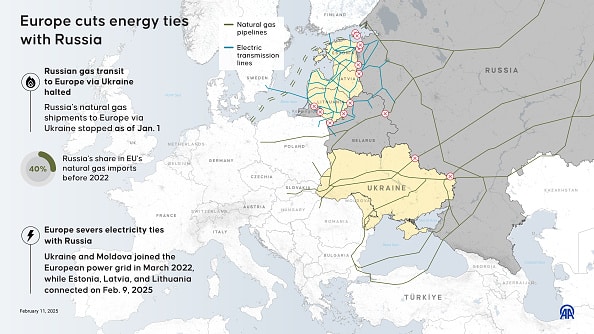This post was originally published on Eco Watch
The Baltic states of Latvia, Estonia and Lithuania unplugged from Russia’s electric grid on Sunday and will now get their power from the European Union’s network.
The move was viewed as vital for Europe’s security and had been in progress since 2007, reported the BBC. It had become more of a priority following Russia’s invasion of Ukraine nearly three years ago.
“Today, history is made,” said EU chief Ursula von der Leyen at a ceremony in Vilnius, the capital of Lithuania. “This is freedom, freedom from threats, freedom from blackmail.”
The Brell power grid — named for Belarus, Russia, Estonia, Latvia and Lithuania — is almost completely controlled by Moscow.
“Long before the Russian tanks crossed into #Ukraine, you were warning us that the cheap gas bought from Russia has a hidden cost. A cost of dependence.” – Ursula von der Leyen told the Baltic states on the occasion of them disconnecting from Russian power grid.
— Anton Gerashchenko (@antongerashchenko.bsky.social) February 9, 2025 at 12:30 PM
President of Poland Andrzej Duda said the transition was “truly symbolic” and would bring more security and resiliency to the region.
“It is the final step towards emancipation from the post-Soviet sphere of dependence,” Duda added, as the BBC reported.
Now members of NATO, the three Baltic countries had not purchased Russian electricity since 2022, but had continued to depend on Moscow for the flow of electricity because of their Brell grid connection.
Von der Leyen warned that NATO needed to remain vigilant of potential retaliation from Russia.
“We’ve reached the goal we strived for, for so long. We are now in control,” said Lithuanian energy minister Žygimantas Vaičiūnas during a press conference, reported The Guardian.
As soon as they were disconnected from Russia’s grid, workers from Latvia cut the electric wires in Vilaka, near the border. The workers handed out pieces of severed wire to members of the cheering crowd.
“We will never use it again. We are moving on,” said Kaspars Melnis, Latvia’s energy minister.
The countries share a 1,015-mile border with Belarus and Russia. They told Minsk and Moscow about the plan to disconnect in 2024 in order to head off any potentially hostile response, The Associated Press reported.
“We have a protocol with the Russians on how everything should be disconnected,” Litgrid CEO Rokas Masiulis told reporters on Saturday.
The trio of Baltic nations became independent in the 1990s after the collapse of the Soviet Union, joining NATO and the EU in 2004. The grid was their only remaining connection to Russia.
“By ending the energy dependence of the Baltic states on Russia, we are leaving the aggressor without the option of using energy as a weapon against us,” said Margus Tsahkna, Estonia’s foreign minister, as reported by The Guardian.
The post Baltic Nations Unplug From Russian Power Grid to Join EU Network appeared first on EcoWatch.





0 Comments